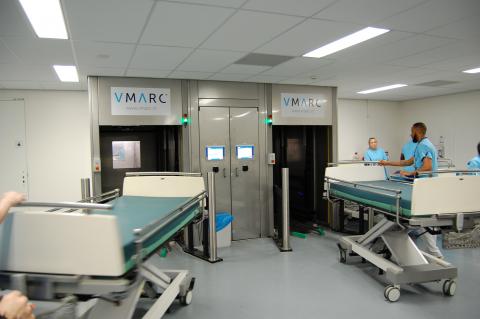Erasmus MC: Leading the way in Innovation Procurement
In January 2016, as part of the EcoQUIP project (of which HCWH Europe is a partner), procurement experts from around Europe gathered at Erasmus MC University Medical Center Rotterdam in the Netherlands, for a study tour and peer learning workshop focused on the centre’s new VMARC bed and mattress cleaning facility.
Erasmus MC cleans 70,000 beds each year and clean beds are seen as essential part of improving the patient experience and preventing the spread of infection. But such facilities are often very energy and water-intensive and the centre has ambitious targets to reduce its carbon footprint and has committed to decrease its energy use by 20% on 2008 levels by 2020.
The previous bed-washing machine was due to be replaced in 2013 and, during the procurement process for the new facility, the hospital set out to identify and procure a more effective and efficient solution.
To this end, the medical centre adopted the Forward Commitment Procurement method, and worked with the EcoQUIP team to set up a cross-departmental project team, which set out to conduct a market sounding exercise through a Prior Information Notice – outlining the projects objectives and timelines for awarding a contract.
The targets:
To meet their target of reducing energy use by 20% (on 2008 levels) by 2020, Erasmus MC wanted a significant reduction in CO2 from the new bed washing facility.
In terms of cleanliness, although no standards exist in this area in the Netherlands, the centre stipulated that the new robotic facility would have to be capable of cleaning beds to at least the same standard as if the beds were hand-washed.
Another key target of Erasmus MC was that the new system would also need to be fully validated and traceable and that, should an outbreak of infectious disease occur, hospital staff would be able to tell whether this part of the cleaning process contributed to it.
Cost was also a considerable factor in the awarding of any tender and the centre looked for a solution that was less expensive than the existing system, with a significant reduction in total cost of ownership (TCO).
Procurement process:
 The procurement process for a new bed washing facility at Erasmus MC took over one and a half years and, once the contract was awarded to IMS Innovations, the system took a further two and a half years to be developed and installed.
The procurement process for a new bed washing facility at Erasmus MC took over one and a half years and, once the contract was awarded to IMS Innovations, the system took a further two and a half years to be developed and installed.
Erasmus MC adopted a ‘forward commitment procurement’ method with a competitive dialogue, whereby they specified a number of ‘unmet needs’ when looking to procure a new bed washing facility. These unmet needs included a substantial reduction in the carbon footprint of the new facility as well as a substantially reduced TCO.
The initial phase of the procurement project involved market engagement, whereby 63 suppliers were attracted to engage with Erasmus MC through a communications and press campaign. Following this, the centre held a ‘market meeting day’ where 60 participants took part (including 9 from other hospitals).
From this, 8 parties were selected to participate in a ‘competitive dialogue’ phase. This involved a further and more concrete discussion of Erasmus MC’s unmet needs and the centre worked with these parties to develop innovative solutions to deliver more TCO and CO2 reductions.

These 8 parties were reduced to 3 when Erasmus MC decided to opt for a mechanical bed washing solution that could be validated and reproduced (in the case of an outbreak of infection which could be traced). A company called IMS Medical was chosen as the winning bidder and a business case was drawn up which included impressive TCO and CO2 reduction results. In order to be able to supply the suggested solution, IMS Medical joined with another company involved in the competitive dialogue to form a brand new enterprise, IMS Innovations, who eventually developed the VMARC facility.
Buying a product that didn’t exist yet was a significant leap of faith for Erasmus MC but the results being achieved by the VMARC facility at the centre speak for themselves and show that the forward commitment procurement procedure greatly worked in the hospital’s favour and delivered impressive results in terms of CO2 reduction.
The results:
In late 2015, Erasmus MC installed two VMARC bed washing machines, which are capable of producing a clean bed every 5 minutes (24 beds every hour and up to 90,000 beds every year [depending on operating hours]).
This new system has led to a 65% reduction in CO2 emissions and has made the beds 17 times cleaner than they were with the previous system (the system is more effective as higher temperatures can be used). The VMARC facility cleans beds to a 95-99% degree of cleanliness (according to ‘ATP’ testing, a test which examines the level of proteins from micro-organisms left on the bed after cleaning) as opposed to the 65% achieved by the previous method (manual washing).
The VMARC system also saves a considerable amount of water in the bed washing process, as it cleans very close to the bed and only uses 6.6 litres of ‘osmosis’ water per bed and mattress (as opposed to other machines, which use up to 35 litres). The system also washes at 65 degrees and without detergents.
Automated bed washing at Erasmus MC has also lead to consistent quality in the beds being cleaned, a validated process and a significant reduction in the physical burden on employees.
Using QR codes, the VMARC facility is also able to integrate track and trace systems, which allow hospital staff to tell when a bed is due for maintenance or inspection.
